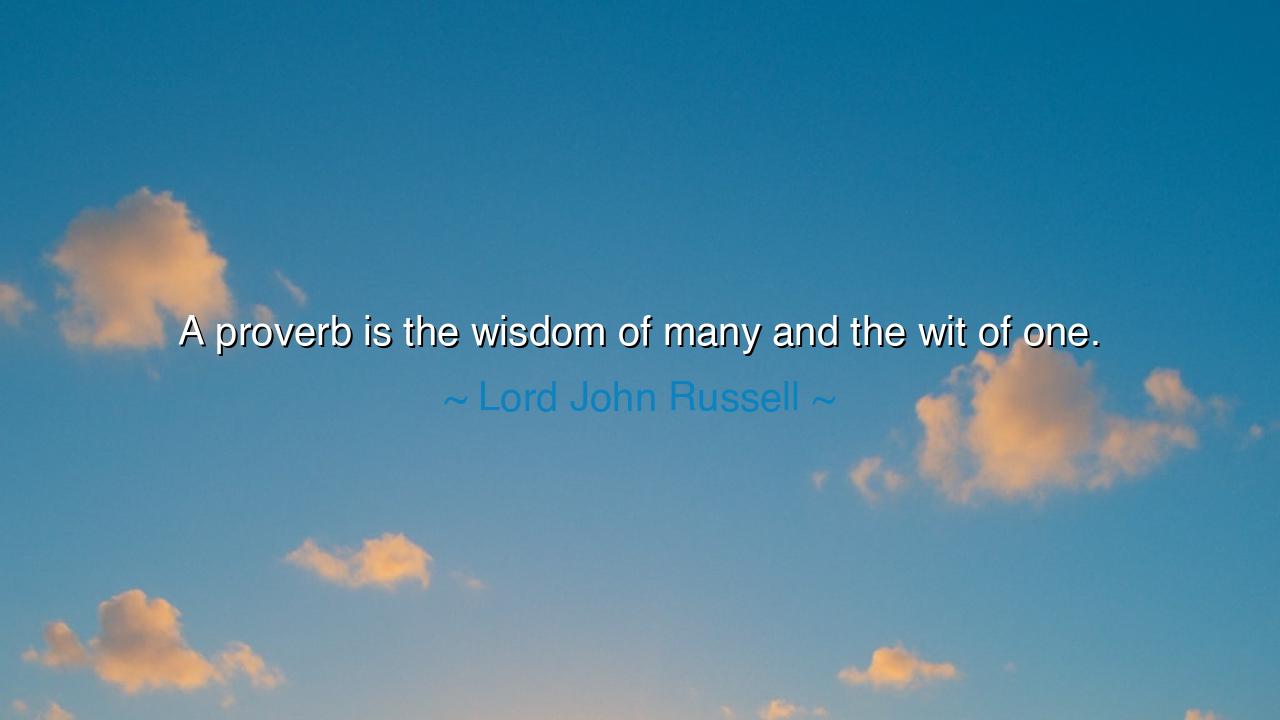
A proverb is the wisdom of many and the wit of one.






Hearken, O children of the ages, to the luminous words of Lord John Russell, who unveils the nature of the proverb as a vessel of enduring human insight. He teaches that a proverb is both the accumulation of wisdom of many and the spark of the wit of one. It distills the experiences, triumphs, and failings of countless souls into a single, piercing expression, and yet its crafting is the art of the singular mind, observing, reflecting, and shaping the eternal truth into words that endure.
Russell reminds us that the power of a proverb lies in its dual heritage. It carries the weight of collective experience, the lessons learned by generations, and yet it shines with the clarity of a single insightful mind. Through such sayings, the knowledge of the ages is compressed, teaching prudence, courage, and understanding to all who listen, while also entertaining, surprising, and delighting with the wit of the observer.
Consider the timeless proverb, “A stitch in time saves nine.” Its wisdom echoes the labors and regrets of countless who have faced the consequences of delay, yet its form is elegant and concise, a testament to the mind that distilled observation into memorable words. In a single utterance, it conveys the accumulated wisdom of many while bearing the wit of one who perceived the principle and shaped it for eternity.
Even in everyday life, the principle holds true. The sayings of elders, the lessons embedded in folk tales, and the adages passed from teacher to pupil carry the combined experiences of communities and the insight of those who articulate them most sharply. A proverb is thus a bridge across generations, carrying both the accumulated understanding of the many and the brilliance of the few who transform insight into expression.
O children of the future, carry this teaching in your hearts: honor the proverbs, for they are the distilled essence of human thought, the union of collective wisdom and singular wit. Reflect upon their guidance, let them shape your deeds, and remember that even a few words, carefully spoken and wisely crafted, may carry the knowledge of countless lifetimes. In this, the voice of the past speaks through the present, illuminating the path of reason, virtue, and understanding.
If you desire, I can also craft a visual, ancient scroll-style presentation of this passage to capture the heroic, timeless, and deeply evocative essence of Russell’s teaching on proverbs, wisdom, and the unity of many voices with one mind.






HYHung Yen
I find this quote thought-provoking because it highlights how human knowledge is both collective and personal. Can a proverb be considered truly wise if it lacks the clever insight that makes it stick in memory? How do proverbs function as educational tools, shaping moral or practical understanding through a combination of shared experience and sharp expression? I’m also interested in how the ‘wit of one’ might sometimes overshadow the communal wisdom it represents.
DKDinh Khuyen
This perspective prompts me to consider the role of authorship and anonymity in wisdom. If a proverb reflects the wisdom of many, does it matter who first articulated it? How does the wit of a single person shape the clarity or memorability of the lesson? I’m curious whether the balance between communal experience and individual genius is essential for a saying to endure across generations, and what factors make some proverbs timeless.
NKLwe ngoc khanh
I feel fascinated by the idea that proverbs encapsulate both general experience and individual cleverness. Does this mean that the most effective proverbs are those that resonate universally while remaining memorable and witty? How does this duality influence how people learn from and transmit cultural wisdom? I also wonder whether modern communication, with its memes and social media, has created a new form of proverb-like expressions that blend collective insight with individual creativity.
HALe Hoang Anh
Reading this, I’m intrigued by the interplay between collective wisdom and individual creativity. Could it be that a proverb succeeds only when the insight of one person captures a truth shared by many? How do proverbs evolve over time as society changes, and does the ‘wit of one’ sometimes conflict with contemporary moral or social norms? I’m curious whether the enduring power of proverbs lies more in brevity, relatability, or cleverness.
VTVy Thanh
This quote makes me think about how collective human experience gets distilled into concise sayings. Does a proverb gain its wisdom solely from the experiences of many, or does the phrasing and insight of one clever mind elevate it? I also wonder how cultural context shapes the meaning of proverbs and whether a saying that resonates in one society might be meaningless or even misleading in another.